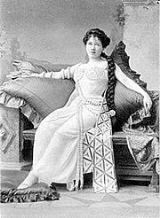
A Greek Slave
Encyclopedia
A Greek Slave is a musical comedy in two acts, first performed on 8 June 1898 at Daly's Theatre
in London
, produced by George Edwardes
and ran for 349 performances. The score was composed by Sidney Jones
with additional songs by Lionel Monckton
and lyrics by Harry Greenbank
and Adrian Ross
. The libretto was written by Owen Hall
. It starred Marie Tempest
, Letty Lind
, Hayden Coffin, Scott Russell
, Huntley Wright
and Rutland Barrington
among other popular London stars. The show had a brief Broadway run in 1899.
The work had stiff competition in London in 1898, as other successful openings included A Runaway Girl
and The Belle of New York
.
by Stephen Sondheim
.
A Greek Slave was in the unfortunate position of following The Geisha
, also by Sidney Jones. This was the biggest stage hit of its era. Therefore, A Greek Slave is often remembered as being the show that was not as successful as The Geisha, rather than being appreciated on its own merits. This show is Jones' best score, with additional hit songs by Monckton. The tunes are catchy, and while the lyrics are witty they also show an appreciation of the classical mythology of the set time period.
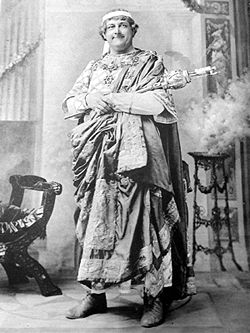
. His daughter Maia pretends to have the gifts of an oracle, and utters incomprehensible prophecies at a suitable price. Among their servants is one Archias, a talented sculptor, whose most recent achievement is a statue of Eros, God of Love, for which his fellow slave Diomed has acted as model. Maia has fallen in love with Diomed. The princess Antonia comes to the soothsayer in disguise and Maia, egged on by the Prefect Pomponius, who has been spurned by the princess, plans a humiliating trick. She announces to the princess that the God of Love has fallen in love with her. The statue is brought forth, and Heliodorus prepares to 'bring it to life'. Diomed is substituted and serenades the princess.
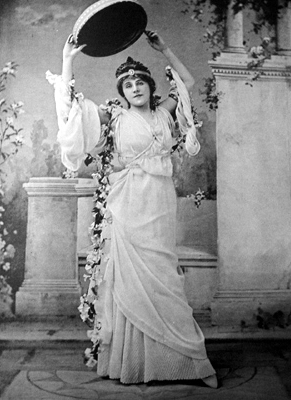
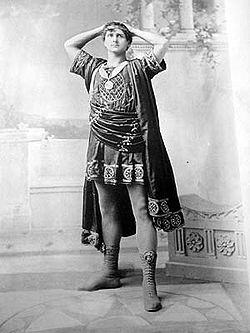
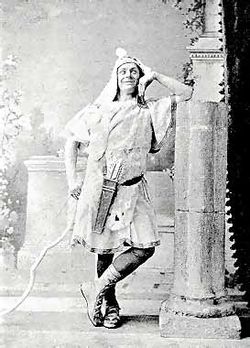 But Heliodorus is planning a double-cross. He disapproves of his daughter's fancy for a slave, and when the seance is over and Maia has intended that Antonia should walk off with the statue, Heliodorus arranges that the real Diomed falls to the princess. But it does her little good. The slave, in his luxurious new surroundings, pines for Maia, and Antonia's love-making goes for nothing. Pomponius, who was anxious to see his marble lady wasting her affection on a marble statue, is furious at the social slight involved, and Heliodorus finds himself in hot water. Eventually, in the middle of the Roman Saturnalia, all is cleared up, and the correct pairs of lovers are united.
But Heliodorus is planning a double-cross. He disapproves of his daughter's fancy for a slave, and when the seance is over and Maia has intended that Antonia should walk off with the statue, Heliodorus arranges that the real Diomed falls to the princess. But it does her little good. The slave, in his luxurious new surroundings, pines for Maia, and Antonia's love-making goes for nothing. Pomponius, who was anxious to see his marble lady wasting her affection on a marble statue, is furious at the social slight involved, and Heliodorus finds himself in hot water. Eventually, in the middle of the Roman Saturnalia, all is cleared up, and the correct pairs of lovers are united.
Act II
Daly's Theatre
Daly's Theatre was a theatre in the City of Westminster. It was located at 2 Cranbourn Street, just off Leicester Square. It opened on 27 June 1893, and was demolished in 1937.-Early years:...
in London
London
London is the capital city of :England and the :United Kingdom, the largest metropolitan area in the United Kingdom, and the largest urban zone in the European Union by most measures. Located on the River Thames, London has been a major settlement for two millennia, its history going back to its...
, produced by George Edwardes
George Edwardes
George Joseph Edwardes was an English theatre manager of Irish ancestry who brought a new era in musical theatre to the British stage and beyond....
and ran for 349 performances. The score was composed by Sidney Jones
Sidney Jones
James Sidney Jones , usually credited as Sidney Jones, was an English conductor and composer, most famous for producing the musical scores for a series of musical comedy hits in the late Victorian and Edwardian periods....
with additional songs by Lionel Monckton
Lionel Monckton
Lionel John Alexander Monckton was an English writer and composer of musical theatre. He was Britain's most popular musical theatre composer of the early years of the 20th century.-Early life:...
and lyrics by Harry Greenbank
Harry Greenbank
Harry Greenbank was an English author and dramatist best known for contributing lyrics to the successful series musicals produced at Daly's Theatre by George Edwardes in the 1890s.-Life and career:...
and Adrian Ross
Adrian Ross
For the NFL player see Adrian Ross Arthur Reed Ropes , better known under the pseudonym Adrian Ross, was a prolific writer of lyrics, contributing songs to more than sixty British musical comedies in the late 19th and early 20th centuries...
. The libretto was written by Owen Hall
Owen Hall
Owen Hall was the pen name of the Irish-born 19th and early 20th century theatre writer and theatre critic James Davis when writing for the stage...
. It starred Marie Tempest
Marie Tempest
Dame Marie Tempest DBE was an English singer and actress known as the "queen of her profession".Tempest became the most famous soprano in late Victorian light opera and Edwardian musical comedies. Later, she became a leading comic actress and toured widely in North America and elsewhere...
, Letty Lind
Letty Lind
Letitia Elizabeth Rudge, better known as Letty Lind , was an English actress, dancer and acrobat, best known for her work in burlesque at the Gaiety Theatre, and in musical theatre at Daly's Theatre, in London....
, Hayden Coffin, Scott Russell
Scott Russell (actor)
Harry Henry Russell, better known as Scott Russell , was an English singer, actor and theatre manager best known for his performances in the tenor roles with the D'Oyly Carte Opera Company...
, Huntley Wright
Huntley Wright
Huntley Wright was an English stage and film actor, comedian, dancer and singer, best known for creating roles in many important Edwardian musical comedies....
and Rutland Barrington
Rutland Barrington
Rutland Barrington was an English singer, actor, comedian, and Edwardian musical comedy star. Best remembered for originating the lyric baritone roles in the Gilbert and Sullivan operas from 1877 to 1896, his performing career spanned more than four decades...
among other popular London stars. The show had a brief Broadway run in 1899.
The work had stiff competition in London in 1898, as other successful openings included A Runaway Girl
A Runaway Girl
A Runaway Girl is a musical comedy in two acts written in 1898 by Seymour Hicks and Harry Nicholls. The composer was Ivan Caryll, with additional music by Lionel Monckton and lyrics by Aubrey Hopwood and Harry Greenbank...
and The Belle of New York
The Belle of New York (theatre)
The Belle of New York is a musical comedy in two acts, with book and lyrics by Hugh Morton and music by Gustave Kerker, about a Salvation Army girl who reforms a spendthrift, makes a great sacrifice and finds true love....
.
Background
The simple plot of the production was based around the tangled love lives and misunderstandings of a Roman household. The same themes and characterisations would resurface some 70 years later in the Broadway show A Funny Thing Happened on the Way to the ForumA Funny Thing Happened on the Way to the Forum
A Funny Thing Happened on the Way to the Forum is a musical with music and lyrics by Stephen Sondheim and book by Burt Shevelove and Larry Gelbart....
by Stephen Sondheim
Stephen Sondheim
Stephen Joshua Sondheim is an American composer and lyricist for stage and film. He is the winner of an Academy Award, multiple Tony Awards including the Special Tony Award for Lifetime Achievement in the Theatre, multiple Grammy Awards, a Pulitzer Prize and the Laurence Olivier Award...
.
A Greek Slave was in the unfortunate position of following The Geisha
The Geisha
The Geisha, a story of a tea house is an Edwardian Musical Comedy in two acts. The score was composed by Sidney Jones to a libretto by Owen Hall, with lyrics by Harry Greenbank. Additional songs were written by Lionel Monckton and James Philip....
, also by Sidney Jones. This was the biggest stage hit of its era. Therefore, A Greek Slave is often remembered as being the show that was not as successful as The Geisha, rather than being appreciated on its own merits. This show is Jones' best score, with additional hit songs by Monckton. The tunes are catchy, and while the lyrics are witty they also show an appreciation of the classical mythology of the set time period.
Roles and original cast

- Maia (Daughter of Heliodorus) -- Marie TempestMarie TempestDame Marie Tempest DBE was an English singer and actress known as the "queen of her profession".Tempest became the most famous soprano in late Victorian light opera and Edwardian musical comedies. Later, she became a leading comic actress and toured widely in North America and elsewhere...
- Antonia (A relative of Cæsar) -- Hilda Moody
- Melanopis, Circe, Nepia (Slaves) -- Gladys Homfrey, Magie May, Elisabeth Kirby
- Lucinia, Flavia, Tullia, Cornelia (Patricians) -- Elise Cook, Olive Morrell, Margaret Ruby, Alice Davis
- Nysa—Miss F. Jamieson
- Iris (A Greek Slave, Confidential Maid of Antonia) -- Letty LindLetty LindLetitia Elizabeth Rudge, better known as Letty Lind , was an English actress, dancer and acrobat, best known for her work in burlesque at the Gaiety Theatre, and in musical theatre at Daly's Theatre, in London....
- Diomed (A Greek Slave in Heliodorus' household) -- C. Hayden CoffinC. Hayden CoffinCharles Hayden Coffin was an English actor and singer known for his performances in many famous Edwardian musical comedies, particularly those produced by George Edwardes....
- Heliodorus (A Persian Soothsayer) -- Huntley WrightHuntley WrightHuntley Wright was an English stage and film actor, comedian, dancer and singer, best known for creating roles in many important Edwardian musical comedies....
- Archias (A Greek Slave, Sculptor in Heliodorus' household) -- Scott RussellScott Russell (actor)Harry Henry Russell, better known as Scott Russell , was an English singer, actor and theatre manager best known for his performances in the tenor roles with the D'Oyly Carte Opera Company...
- Manlius, Lollius, Curius, Silius (Patricians) -- Charles Magrath, Frank Boor, Donald Hall, Akerman May
- Marcus Pomponius (Prefect of Rome) -- Rutland BarringtonRutland BarringtonRutland Barrington was an English singer, actor, comedian, and Edwardian musical comedy star. Best remembered for originating the lyric baritone roles in the Gilbert and Sullivan operas from 1877 to 1896, his performing career spanned more than four decades...
Synopsis
Heliodorus, a Persian soothsayer, looks into the future love lives of his wealthy matrons of Imperial RomeRome
Rome is the capital of Italy and the country's largest and most populated city and comune, with over 2.7 million residents in . The city is located in the central-western portion of the Italian Peninsula, on the Tiber River within the Lazio region of Italy.Rome's history spans two and a half...
. His daughter Maia pretends to have the gifts of an oracle, and utters incomprehensible prophecies at a suitable price. Among their servants is one Archias, a talented sculptor, whose most recent achievement is a statue of Eros, God of Love, for which his fellow slave Diomed has acted as model. Maia has fallen in love with Diomed. The princess Antonia comes to the soothsayer in disguise and Maia, egged on by the Prefect Pomponius, who has been spurned by the princess, plans a humiliating trick. She announces to the princess that the God of Love has fallen in love with her. The statue is brought forth, and Heliodorus prepares to 'bring it to life'. Diomed is substituted and serenades the princess.



Musical numbers
Act I- No. 1. Opening Chorus On the Dial—Chorus of Slaves
- No. 2. Song The Wizard—Heliodorus and Chorus of Slaves
- No. 3. Quartette and Chorus By Bacchus! -- Silius, Lollius, Curius, Manlius, Chorus of Slaves
- No. 4. Song (plus Dance) Confidential—Iris with Curius, Silius, Lollius, Manlius and Chorus of Slaves
- No. 5. Song Freedom Words by Henry Hamilton—Diomed
- No. 6. Oracle Scene and Quartette—Maia, Roman Ladies Licinia, Flavia, Tullia, Cornellia and Chorus of Slaves
- No. 7. Song The Lost Pleiad—Maia with Heliodorus and Marcus Pomponius
- No. 8. Duet All Is Fair—Maia and Diomed
- No. 9. Song I Cannot Love—Antonia
- No. 10. Song (plus Dance) I Should Rather Like To Try, Music by Lionel Monckton—Iris
- No. 11. Trio Whirligig—Marcus Pomponius, Iris, Heliodorus
- No. 12. Processional March and Chorus of Welcome—Chorus of Slaves
- No. 13. Solo and Scene plus Ensemble Invocation—Maia, Antonia, Diomed, Chorus of Slaves
- No. 14. Finale Bear The God Of Love Along—Maia, Heliodorus, Chorus of Slaves
Act II
- No. 15. Opening Chorus Here at Baiae On The Bay—Chorus
- No. 16. Song A Song of Love—Antonia
- No. 17. Duet Oh, What Will Be The End Of It?, Music by Lionel Monckton—Iris and Heliodorus
- No. 18. Song The Golden Isle—Maia
- No. 19. Concerted Number Topsy-Turvy—Lucinia, Flavia, Manlius, Archias and Others
- No. 20. Chorus of Saturnalia—Chorus of Slaves
- No. 21. Song The Revels—Archias and Chorus of Slaves
- No. 22. Song The Girl Of My Heart—Diomed and Chorus
- No. 23. Song I Want To Be Popular, Music by Lionel Monckton—Marcus and Chorus
- No. 24. Song (plus Dance) I'm A Naughty Girl, Music by Lionel Monckton—Iris and Chorus
- No. 25. Song and Chorus A Frog He Lived In A Pond—Iris and Chorus
- No. 26. Song (plus Dance) Nothing But Nerves—Heliodorus
- No. 27. Solo and Scene plus Ensemble Forgive—Maia, Diomed and Chorus
- No. 28. Finale Act II Hail Antonia, Hail!

